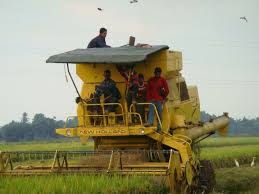How rising diesel prices affect Malaysian farmers: Read more
Understanding the Impact of Diesel Price Hike on Malaysian Farmers Discover how the recent RM1.20 per liter increase in diesel prices is affecting Malaysian rice farmers. Head of Information for the United Youth Force (Armada) of Bersatu, Mohd Ashraf Mustaqim Badrul Munir, raises concerns about the financial strain on farmers and the broader economic implications.
LIFE


KUALA-LUMPUR - The recent rise in diesel prices, now up to RM1.20 per liter, is causing major ripples in Malaysia for farmers, especially industrious rice farmers.
The move raised concerns, as highlighted by Mohd Ashraf Mustaqim Badrul Munir, Information Officer of the United Youth Forces (Armada) of Parti Asli Bersatu Malaysia (Bersatu).
He fears that the already significant increase will put a heavy burden on farmers who are already struggling with high operating costs.
Diesel price hike: What it means for farmers
In a country where agriculture plays a key role in the economy, the diesel price hike to RM3.35 per liter is a big success.
Diesel is the lifeline of farmers, widely used in their machinery and daily operations.
The price change has caused an uproar in the peninsula, while diesel prices in Sabah, Sarawak and Labuan remain at RM2.15 per liter thanks to the subsidized Diesel Management System (SKS) 2.0.
The purpose of the system is to suppress the effect of prices of consumer goods using the fleet card method for logistics vehicles.
Distress of farmers
Ashraf emphasizes that the price of diesel for farmers fluctuates between 6,000 and 10,000 liters per planting season.
These significant costs, coupled with the recent increase in prices, make it almost impossible for farmers to manage their costs without additional financial strain.
He criticizes the authorities' neglect of the rice farming sector, accusing them of prioritizing capitalist interests over the welfare of local farmers.
Role of Subsidies
The government's decision to withdraw diesel subsidies without a well thought out mechanism has created fear among farmers.
Ashraf emphasizes that subsidies are crucial for farmers who rely on them to ensure the sustainability of their operations.
The absence of these subsidies means that farmers have to bear higher costs, which can lead to higher rice prices for consumers and create a domino effect on the entire economy.
Government response and proposals
In response, Finance Minister II Datuk Seri Amir Hamzah Azizan confirmed that SKS 2.0 will mitigate the impact on consumer prices.
However, Ashraf calls for a review of the mechanism for disbursing financial aid through agencies such as the Regional Farmers Association (PPK), the Ministry of Agriculture and the Youth Agricultural Promotion Institute (MADA).
He suggests that continued support for farmers is crucial to prevent unscrupulous political parties from exploiting the price of rice.
The Bigger Picture: Economic and Social Impacts
The impact of rising diesel prices goes beyond immediate operating costs.
They deal with broader economic and social issues.
The growth of young and middle-aged people working in agriculture threatens their livelihood and future in agriculture.
This prevents the younger generations from engaging in agriculture, which can lead to a decline in agricultural productivity in the long run.
Cooperation between community and government
Meeting these challenges requires cooperation between government and community.
Farmers must voice their concerns and work closely with local representatives to ensure their needs are met.
On the other hand, the government must be proactive and provide adequate support and resources to help farmers adapt to these changes.
Conclusion: Move Forward Together
As Malaysia goes through this difficult period, it is vital to recognize the importance of the agricultural sector and the people who support it.
By improving support mechanisms, ensuring fair prices and fostering an enabling environment, both government and the community can work together to overcome these barriers.
Farmers are the backbone of the country's food supply and their welfare should be a priority.
Going forward, let us advocate for policies that will uplift our farmers and secure the future of Malaysian agriculture.
Call to Action
For those of us who belong to the young and middle-aged generations, it is important to be informed and involved in these issues.
Every little effort count, whether it's community involvement or supporting local agricultural initiatives.
We make sure farmers get the support they need to feed people and boost our economy.
Understanding the Impact of Diesel Price Hike on Malaysian Farmers
Discover how the recent RM1.20 per liter increase in diesel prices is affecting Malaysian rice farmers. Head of Information for the United Youth Force (Armada) of Bersatu, Mohd Ashraf Mustaqim Badrul Munir, raises concerns about the financial strain on farmers and the broader economic implications.


